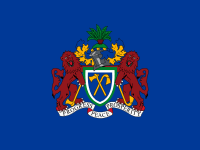List of heads of state of the Gambia
 |
| This article is part of a series on the politics and government of the Gambia |
| Constitution |
|
Executive |
|
Legislative |
|
This is a list of the heads of state of the Gambia, from the independence of the Gambia in 1965 to the present day.
From 1965 to 1970 the head of state under the Gambia Independence Act 1964 was the Queen of the Gambia, Elizabeth II, who was also the Monarch of the United Kingdom and the other Commonwealth realms. The Queen was represented in the Gambia by a Governor-General. The Gambia became a republic in 1970 and the Monarch and Governor-General were replaced by an executive President.
Monarch (1965–1970)
The succession to the throne was the same as the succession to the British throne.
| № | Monarch (Birth–Death) |
Portrait | Reign | Royal House | Prime Minister | |
|---|---|---|---|---|---|---|
| Reign start | Reign end | |||||
| 1 | Queen Elizabeth II (1926–) |
 |
18 February 1965 | 24 April 1970 | Windsor | Jawara |
Governor-General
The Governor-General was the representative of the Monarch in the Gambia and exercised most of the powers of the monarch. The Governor-General was appointed for an indefinite term, serving at the pleasure of the Monarch. After the passage of the Statute of Westminster 1931, the Governor-General was appointed solely on the advice of the Cabinet of the Gambia without the involvement of the British government. In the event of a vacancy the Chief Justice served as Officer Administering the Government.
- Status
| № | Governor-General (Birth–Death) |
Portrait | Tenure | Monarch | Prime Minister | |
|---|---|---|---|---|---|---|
| Took office | Left office | |||||
| 1 | Sir John Paul (1916–2004) |
 |
18 February 1965 | 9 February 1966 | Elizabeth II | Jawara |
| 2 | Sir Farimang Mamadi Singateh (1912–1977) |
 |
9 February 1966 | 24 April 1970 | Elizabeth II | Jawara |
First Republic (1970–1994)
Under the 1970 Constitution, the first constitution of the Republic of the Gambia, the President replaced the Monarch as executive head of state. The President was elected by the National Assembly for a five-year term. In the event of a vacancy the Vice-President served as Acting President.
- Status
| № | President (Birth–Death) |
Portrait | Tenure | Elected | Political affiliation (at time of appointment) | ||
|---|---|---|---|---|---|---|---|
| Took office | Left office | ||||||
| 1 | Sir Dawda Jawara (1924–) |
.jpg) |
24 April 1970 | 22 July 1994 (deposed.) |
1972 1977 1982 1987 1992 |
People's Progressive Party | |
Military rule (1994–1996)
Colonel Yahya Jammeh led a coup d'état which overthrew President Jawara and his government, all political parties and Parliament were dissolved.
| № | Head of State (Birth–Death) |
Portrait | Tenure | Military | ||
|---|---|---|---|---|---|---|
| Took office | Left office | |||||
| 2 | Colonel Yahya Jammeh (1965–) |
 |
22 July 1994 | 18 October 1996 | Armed Forces Provisional Ruling Council | |
Second Republic (1996–present)
Under the current constitution of the Republic of the Gambia, the President is executive head of state. The President is elected by popular vote for a five-year term. In the event of a vacancy, the Vice-President will serve as Acting President.
- Status
| № | President (Birth–Death) |
Portrait | Tenure | Elected | Political affiliation (at time of appointment) | ||
|---|---|---|---|---|---|---|---|
| Took office | Left office | ||||||
| (2) | Yahya Jammeh (1965–) |
 |
18 October 1996 | 21 January 2017 | 1996 2001 2006 2011 |
Alliance for Patriotic Reorientation and Construction | |
| 3 | Adama Barrow (1965–) |
 |
19 January 2017[1] | Incumbent | 2016 | United Democratic Party | |
Standards
.svg.png) Governor-General's Standard
Governor-General's Standard Presidential Standard
Presidential Standard
Living former heads of state
There are three living former Gambian Heads of State:
| Image | Name | Term/Reign | Office | Date of birth |
|---|---|---|---|---|
 |
Elizabeth II | 1965–1970 | Queen of the Gambia | 21 April 1926 |
.jpg) |
Sir Dawda Jawara | 1970–1994 | President of the Gambia | 16 May 1924 |
 |
Yahya Jammeh | 1994–1996 1996–2017 |
Military ruler President of the Gambia |
25 May 1965 |
Notes
- ↑ Presidency was in dispute from 19 January 2017 to 21 January 2017.